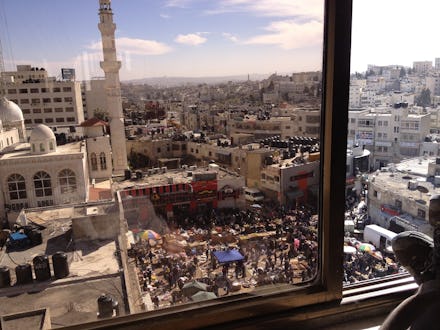Hostels Are Sprouting Up in the West Bank, Showing a Side of Palestine Few Americans See

From the windows of Area D, on the top floor of a central Ramallah high-rise, the view is astonishing. Past the fruit market and emerald-studded minarets is hilly, urban sprawl; beyond that, West Jerusalem. Psagot, a settlement, is closer. It is perched on the outskirts of the Palestinian city.
The West Bank is hardly a backpacking hotspot. But despite profound obstacles, Area D is the second hostel to have opened in Ramallah in recent months.
The first, Hostel in Ramallah, opened in June, and is thriving. The walls are covered in messages from travellers, and in the cosy kitchen visitors — a European youth delegation, backpackers, volunteers, students — drink tea, chat and make friends with the hostel dog. All year, the hostel features a packed schedule including films, Palestinian cooking nights and tours.
Image Credit: Area D
"We want to show all the faces of Palestine," says Muhab Alami, 31, who set up the hostel with his brother last June. "But you don't really have to tell people much: They just need to go out and see for themselves."
Projects like this are unusual in the West Bank, where independent travel has been seriously limited. Both hostels had to fight hard against suspicion and conservatism in the local governments, and Palestinian tourism is restricted by occupation and fear. "Even when tourists do come," explains Wajdy Hussein, a representative at Ramallah's tourist office, "Israel often gets the benefits, not Palestinians."
But this isn't just about control of the borders. Big attractions like the Dead Sea are in Area C, where full Israeli control prevents Palestinians from developing tourist infrastructure. Advertisements often describes top Palestinian sites as being part of Israel. Millions visit the West Bank every year, but a relatively small proportion stay overnight: Instead, tour buses drop off groups in hotspots like Bethlehem, where visitors sight-see for a few hours before being ferried to hotels on the other side of the Green Line.
The arrangement keeps tourist dollars in Israel and prevents travellers from having contact with Palestine. Under different circumstances, the tourism industry could be thriving. The West Bank is small, but it includes vast, mountainous desert around the Dead Sea, hikes past monasteries in plunging wadis and some of the world's most ancient and important cities.
Image Credit: Flickr/Marcel Masferrer Pascual. A view of Nablus, a city in the West Bank, at night.
For Muhab, who is from Jerusalem, the attractions aren't just a business opportunities. "When I backpacked myself, it made me really sad to realise that some people don’t even accept the idea of Palestine as a country," he explained. "Others see any resistance here as terrorism. I realized that if I wanted to change that, I'd have to reach out to people."
And while foreign passports and financial privileges protect tourists from seeing the harsh reality of Palestine, a visit to the West Bank makes the occupation difficult to miss. Travelling means passing through armed, fortified checkpoints. In Hebron's picturesque old city, a wire mesh is strung up to protect the Palestinian market from rubbish and bricks thrown by settlers. Violence, whether in the form of regular Friday protests or outbreaks that follow a fatality, is common.
Image Credit: Flickr/young shanahan. Hebron's old market, covered with wire.
Both founders think seeing this will have a powerful effect. "When you actually see the wall, and you meet the people who live in the shadow of it, whose land has been confiscated by settlements, you start to understand," said Area D's founder, who picked the name to highlight Areas A,B and C: the rarely recognized divisions that are such a defining part of life in the West Bank.
The approach, of course, is problematic. Occupation is a stark reality for Palestinians: Many find it troubling that tourists might come to gawp at military rule, creating an industry that doesn't resist but rather feeds on oppression. The hostel founders are awake to that, and regard their project as a positive. "Perhaps when some people arrive they do just want a T-shirt saying 'I got teargassed in Palestine'" Area D's founder said. "But then they talk to people, and listen, and start to understand."
Muhab agrees. "I think it’s a big problem for Palestinians that we keep ourselves in a box, and push people out. We need to let people in," he said. "Even if they don't think about first, later on they'll see something in the news, or they'll talk to people, and then they'll have to reflect on what they've seen and what it's like here." In addition to connecting people in the West Bank, the hostel enables Palestinians to benefit from Palestine's resources, and shape the conversation around them.
Image Credit: Flickr/Michele Benerecetti. A man walks past the part of the separation wall surrounding Aida refugee camp in Bethlehem.
The new backpacker business is also creating unexpected ripples. When his hostel first opened, Muhab explained, booking websites simply didn't list Palestine as a place. Now, after a lot of campaigning, all but one of the major booking sites have introduced territory categories for Palestine.
The success so far means Muhab is optimistic. "More and more people will come," he said. "What we're trying to do is unusual, it's about cultural exchange, and sometimes people don't understand. But I don't need to wait for people to give to permission to do what I need to do for my country."